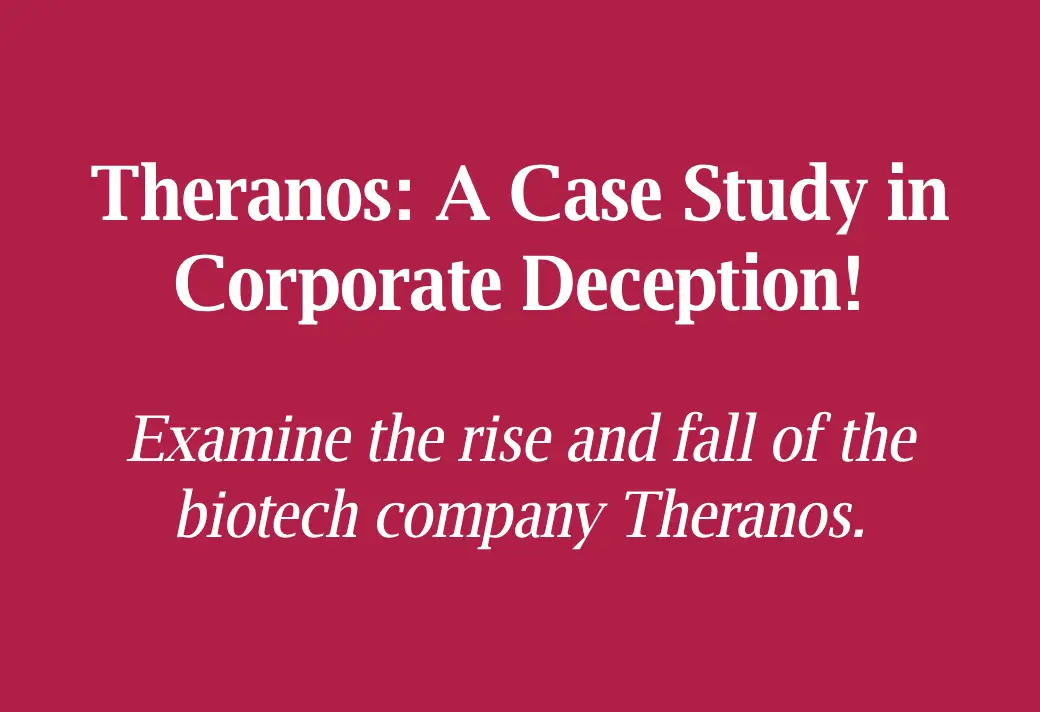In the world of business, trust and transparency are crucial elements for success. However, in recent years, one company has brought into question these fundamental principles. Theranos, a once highly praised biotech company, has become a cautionary tale of corporate deception.
Founded in 2003 by Elizabeth Holmes, Theranos promised to revolutionize the healthcare industry with its revolutionary blood-testing technology. With a valuation of over $9 billion at its peak, the company attracted high-profile investors and partnerships with major corporations.
However, as the truth began to unravel, it became evident that Theranos was built upon a foundation of lies and deceit. This article will examine the rise and fall of Theranos, and how its downfall serves as a case study in corporate deception.
From its meteoric rise to its dramatic downfall, we will explore the factors that led to the downfall of this once-promising company and the lessons that can be learned from its demise. Through this in-depth analysis, we can gain a better understanding of the importance of ethical practices and transparency in the corporate world, and the consequences of veering off this path.
Earn a certificate in your dream career for an affordable price at IAP Career College today!
Theranos: From startup to scandal.
The rise and fall of the biotech company Theranos stands as a cautionary tale in the world of corporate deception. Once hailed as a revolutionary healthcare company, Theranos promised to revolutionize the way blood tests were conducted by offering a fast and inexpensive alternative to traditional methods.
However, as the Theranos case study reveals, the company’s lofty claims were built upon a foundation of false promises and misrepresentation. Investigations eventually uncovered a web of deceit, with founder Elizabeth Holmes and former COO Sunny Balwani facing charges of fraud.
The Theranos scandal serves as a stark reminder of the importance of transparency, ethical practices, and the need for rigorous oversight in the world of business and innovation.
A deceptive empire unraveled: Theranos.
The downfall of Theranos, once regarded as a promising empire in the biotech industry, serves as a stark reminder of the consequences of fraudulent practices and deception. As the Theranos case study unraveled, it became apparent that the company had built its success on a foundation of lies and misrepresentation.
Founder Elizabeth Holmes, hailed as a visionary entrepreneur, now faces charges of fraud, highlighting the devastating impact of unethical behavior on both individuals and the wider business community. This unfortunate tale underscores the need for robust oversight, transparency, and ethical practices to maintain trust and integrity in the corporate world.
The Theranos case study stands as a reminder of the importance of upholding ethical standards and holding executives accountable for their actions.
Analyzing the Theranos business model.
Theranos, once considered a groundbreaking biotech company, provides a valuable case study in analyzing a failed business model. The company claimed to have developed a revolutionary blood testing technology that would disrupt the healthcare industry.
However, a closer examination of the Theranos business model reveals several critical flaws. One of the key issues was the lack of transparency and accountability in the company’s operations. Theranos operated in secrecy, withholding vital information from investors, regulators, and the public.
Additionally, the company’s technology faced significant reliability and accuracy challenges, leading to doubts about its efficacy. These fundamental flaws, combined with the deceptive practices and inadequate corporate governance, ultimately led to the downfall of Theranos.
This case serves as a cautionary tale, highlighting the importance of sound business strategies, ethical conduct, and genuine innovation in building a sustainable and successful enterprise.
The downfall of Elizabeth Holmes.
The downfall of Elizabeth Holmes, the founder and former CEO of Theranos, can be attributed to a combination of factors that ultimately exposed the fraudulent practices within the company. Holmes, once hailed as a visionary entrepreneur, faced mounting scrutiny as investigations revealed the discrepancies between the grand promises made by Theranos and the actual capabilities of their blood testing technology.
The Theranos case study sheds light on the consequences of prioritizing hype and ambition over scientific rigor and ethical business practices. As the truth unfolded, Holmes faced legal repercussions and a loss of credibility, highlighting the importance of integrity and transparency in the corporate world.
Theranos and the power of storytelling.
Throughout the rise and fall of Theranos, one cannot overlook the significant role that storytelling played in shaping the company’s narrative and captivating the public’s imagination. From Elizabeth Holmes’ charismatic persona to the compelling narrative of revolutionizing healthcare through innovative technology, Theranos exemplified the power of storytelling in captivating investors, employees, and the general public.
The mesmerizing tale of a young female entrepreneur aiming to disrupt the medical industry with a groundbreaking invention was a narrative that resonated deeply with people. This story helped Theranos attract massive investments and build a loyal following, despite the lack of verifiable evidence or scientific validation to support their claims.
The Theranos case study serves as a reminder of the influence that storytelling can have in shaping perceptions, generating hype, and ultimately, the potential dangers of relying solely on narratives without substantial evidence and due diligence.
The dangers of blind admiration.
Blind admiration is a perilous phenomenon that can have devastating consequences, as exemplified by the Theranos case study. When individuals or organizations are blindly admired, their flaws and shortcomings are often overlooked or dismissed.
The allure of a charismatic leader or a captivating narrative can cloud judgment and prevent critical thinking. In the case of Theranos, blind admiration allowed for the perpetuation of false claims and deceptive practices, leading to significant financial losses, damaged reputations, and potential harm to patients.
It serves as a stark reminder that blind admiration can lead to a lack of accountability and an erosion of trust, highlighting the importance of healthy skepticism and thorough due diligence in any form of admiration or support.
Investigating Theranos’ fraudulent practices.
The investigation into Theranos’ fraudulent practices revealed a web of deceit that spanned several years. With promises of revolutionary blood-testing technology, the company managed to secure billions of dollars in investments and partnerships with reputable organizations.
However, as scrutiny mounted, it became evident that Theranos had vastly exaggerated the capabilities of its technology and misled both investors and the public. Through a series of investigations and whistleblower testimonies, it was uncovered that the company had been using commercially available machines for most of its tests, rather than the proprietary devices it claimed to have developed.
The investigation further revealed instances of manipulated test results and widespread disregard for regulatory compliance. The unraveling of Theranos serves as a cautionary tale, highlighting the importance of thorough investigations and regulatory oversight to prevent such instances of corporate deception in the future.
The role of investors in Theranos’ collapse.
Investors played a significant role in the collapse of Theranos, as their trust and financial support fueled the company’s meteoric rise. The allure of revolutionary medical technology and the potential for lucrative returns enticed many investors to pour billions of dollars into Theranos, without conducting thorough due diligence.
However, in their eagerness to be part of a groundbreaking venture, investors may have overlooked red flags and failed to scrutinize the company’s claims and practices adequately. The lack of proper oversight and skepticism allowed Theranos to perpetuate its deception for an extended period.
The Theranos case study serves as a stark reminder for investors to exercise caution, conduct comprehensive research, and exercise due diligence before investing in any high-profile, seemingly groundbreaking venture. The collapse of Theranos highlights the importance of thorough investigation and critical analysis in the investment decision-making process.
Lessons learned from Theranos debacle.
The Theranos case study offers a plethora of valuable lessons for corporations and regulators alike. Firstly, it emphasizes the significance of maintaining transparency and ethical conduct within the corporate world.
Theranos’ deceptive practices and falsified claims not only led to the downfall of the company but also eroded trust in the entire biotech industry. This incident underscores the importance of integrity, honesty, and accountability in business operations.
Additionally, the Theranos debacle highlights the importance of regulatory oversight and the need for robust mechanisms to detect and prevent fraud. Regulators must be vigilant in monitoring and scrutinizing the claims and practices of companies, particularly those operating in high-risk industries.
Lastly, this case study serves as a reminder that innovation should not come at the expense of rigorous scientific validation. Companies must prioritize thorough testing and verification of their products before bringing them to market, ensuring that they meet the highest standards of effectiveness and safety.
Ultimately, the Theranos case study reinforces the need for ethical practices, strong regulatory oversight, and a commitment to scientific rigor in the corporate world.
The aftermath of Theranos’ deception.
The aftermath of the Theranos case study has had far-reaching implications for both the biotech industry and corporate governance as a whole. Following the exposure of Theranos’ deception, investor confidence in the biotech sector was significantly undermined, leading to increased scrutiny and skepticism surrounding groundbreaking health technologies.
The case also sparked a broader conversation about the role of regulatory bodies in protecting the public from fraudulent practices. As a result, there has been a push for more stringent regulations and oversight in the biotech and healthcare sectors to prevent future instances of corporate deception.
Additionally, the downfall of Theranos serves as a cautionary tale for entrepreneurs and investors, highlighting the importance of due diligence and critical evaluation when assessing the credibility and viability of innovative companies.
The Theranos case study serves as a stark reminder of the devastating consequences that can arise from a lack of ethical standards and transparency within the corporate world.
Conclusion: Theranos: A Case Study in Corporate Deception
The story of Theranos serves as a cautionary tale for businesses and investors alike. It highlights the importance of transparency, ethical practices, and proper regulation in the corporate world.
The downfall of Theranos and its founder, Elizabeth Holmes, should serve as a reminder to always conduct thorough research and due diligence before investing in a company or product.
As for Theranos, its legacy will forever be marked by deception and dishonesty, a reminder of the consequences of greed and hubris in the business world.





